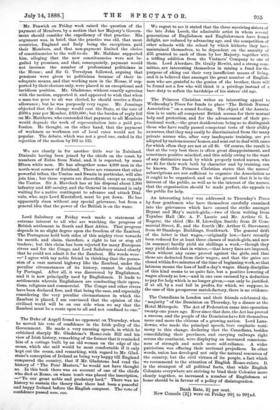Mr. Fenwick on Friday week raised the question of the
payment of Members, by a motion that her Majesty's Govern- ment should consider the expediency of that practice. His argument was, in brief, that the practice was old, that most countries, England and Italy being the exceptions, paid their Members, and that non-payment limited the choice of constituencies to the well-to-do. Mr. Haldane supported him, alleging that the new constituencies were not be- guiled by promises, and that, consequently, payment would not increase the number of professional politicians in the House ; and Sir G. Trevelyan followed, arguing that pensions were given to politicians because of their in- adequate means, and that working men in the House, if sup- ported by their electors only, were placed in an exceptional and invidious position. Mr. Gladstone, without exactly agreeing with the motion, supported it, and appeared to wish that when a man too poor to sit was elected, he should receive a State allowance ; but he was purposely very vague. Mr. Jennings objected that the change would cost the State, at the rate of £500 a year per Member, £330,000; but the burden of reply fell on Mr. Matthews, who contended that payment to all Members would degrade the work of representation into a paid pro- fession. He thought, on the other hand, that the payment of workmen as workmen out of local rates would not be popular. The debate, which was not a good one, ended in the rejection of the motion by 192 to 135.


































 Previous page
Previous page